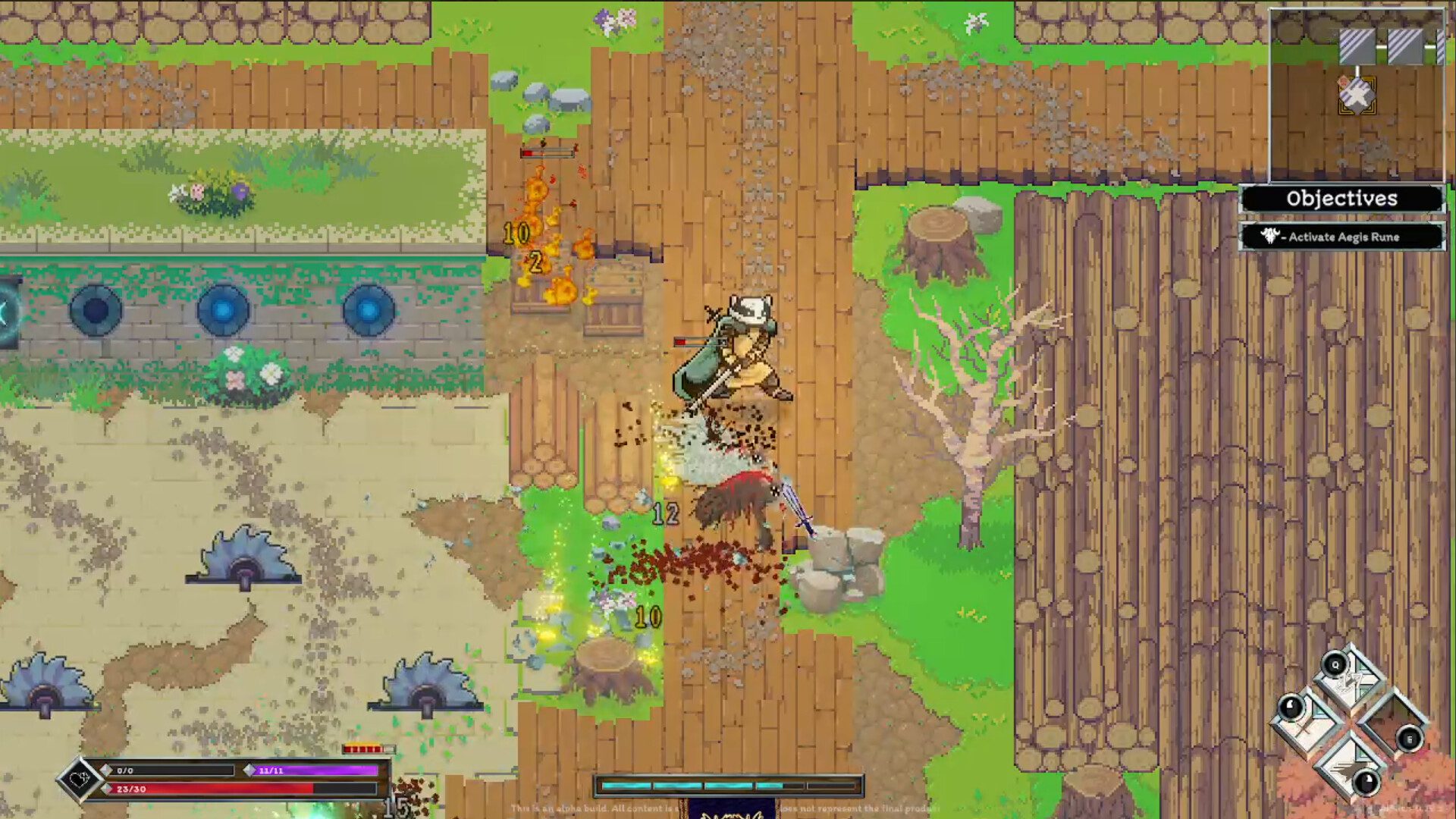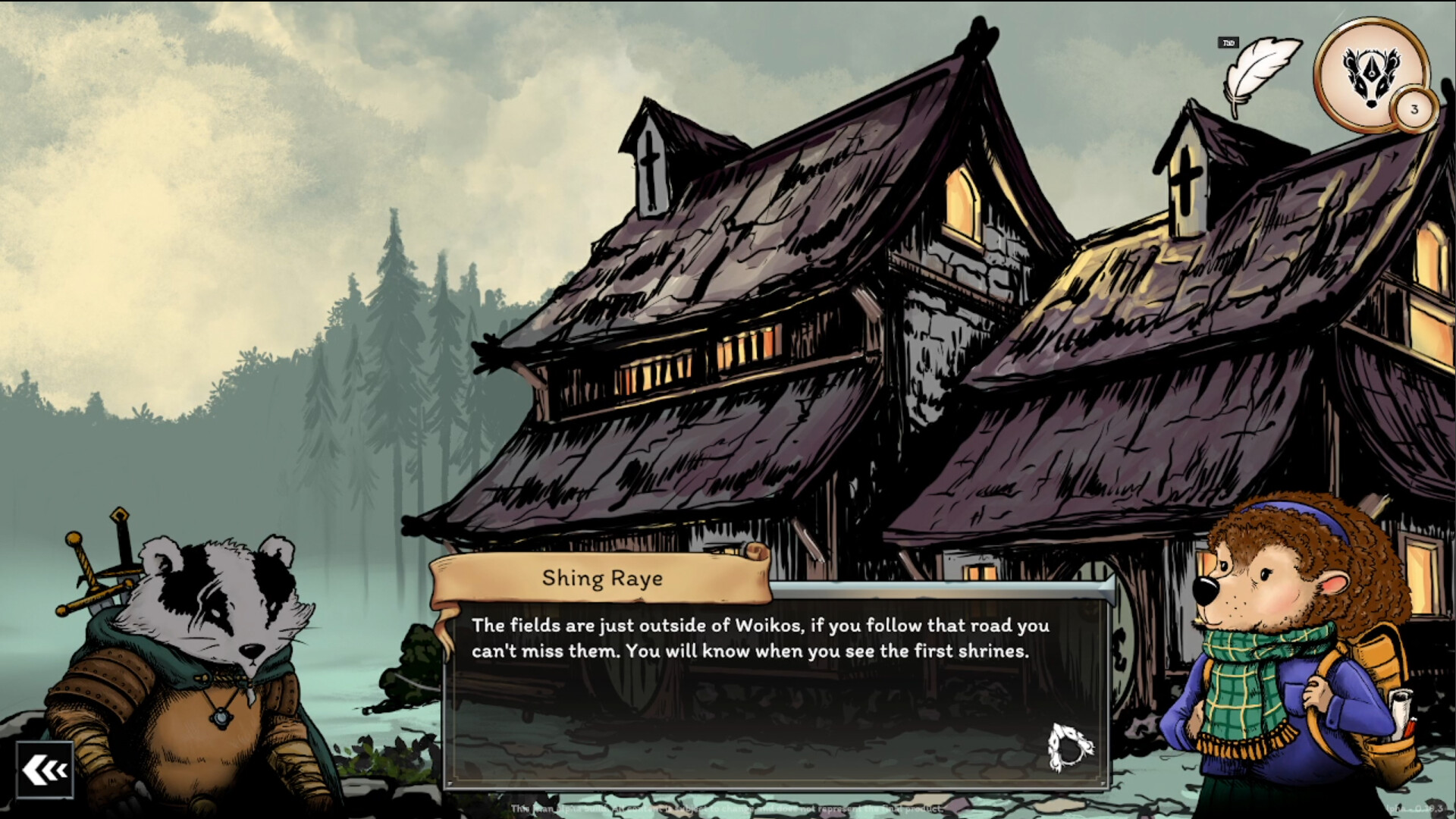When I was a kid, I adored Redwall, Brian Jacques’ fantasy book series about a group of animal-esque people who lived in an abbey touched by the spirit of a holy warrior and who fought off monstrous threats, sought to be heroes, and had amazing feasts. It was a delight, and it’s perhaps one of the most noteworthy examples of anthropomorphic fantasy; a setting concept that has become a TTRPG staple through games like Humblewood and Root. That root is what Willow Guard, a new hack-and-slash RPG published by MiSide, strives to be.
Willow Guard tells the story of Ghweros, a young badger and a member of the Willow Guard, who strives to defend the people in the name of an ancient Willow god. The badger was summoned to a village in the north, where monsters of all sorts were assaulting locals. As he gets to know the residents and push back the monsters, Ghweros discovers that there is something far darker going on, and decides to dive into the pool of dark secrets hidden beneath the surface.
How to Play Willow Guard:

On its face, Willow Guard is a video game where you hack and slash through monsters, dashing around them and swinging your trusty sword through mutated animalesque creatures who seek your doom. As you do so, you build up stamina, which allows you to draw cards from your deck. These cards provide healing, new attacks, buffs, and an assortment of other abilities you can use throughout gameplay. You’ll then have to explore the dungeons and maps to find treasure, craft cards, and strengthen your character through this play if you hope to survive long-term. Each card is usually assigned to either left or right click button or Q and E if related to abilities.
The combat is also roguelike, as maps and battle arenas regularly change each time that you enter an area,
Then, there’s the storytelling between “dungeons,” where the player will interact with a variety of locals and NPCs while exploring.
Ghweros has a currency called “Focus”, which he can use to analyze various scene points. For example, he might notice that a guard stationed atop an inn is watching him warily while pointing a crossbow at him, or he might notice that the city’s historical roots are deeper than they entail. Each one costs a set amount of focus, which will grow as the player goes further into the game.
The game also has four of what it calls “Inclinations”, or approaches to a subject. Ghweros can approach a conversation with a focus on his Creed as a Willow Guard, with Empathy, with Focus, or with Neuroticism (aka focusing on particular details, perhaps too much.) As these level up, they might give a player special abilities to use in combat, such as Action Surge.
As the players travel and talk to folks, they’ll gather items, stories, and “Clues,” which are story-related items that they can share with other characters to gain insights.
First Impressions:

I was only able to play the first three hours of the game, so these are my first impressions of it.
The art of Willow Guard is delightful. The hand-drawn art of the characters is expressive and captures both the animalistic energy of the NPCs as well as the expressive human interactions that they have. 2D art is unique and stands out compared to other hack and slash, using a pixelated aesthetic to do so. The music did eventually grow quite repetitive and stale, relying on rather simplistic beats and electronic music to enhance the combat music.
The gameplay seems simple at first, but it becomes tedious. Ghweros starts with a rather simple deck that has to be expanded with items as they go forward, and the deck itself is a bit sparse, from knives to healing salves to other basic items. Many of these will require some grinding, as monster parts and plants will be needed to succeed. It was also excessively easy to die, as a single bite from certain monsters could easily cause your small pool of health to diminish quickly due to being poisoned.
There were options for improving gear and stats, but doing so was also excessively grindy. If that sort of Diablo-esque “hack through monsters” is something you enjoy, you may find it worth your time, but I struggled with it.
The lore is clearly well-written and notably deep, as it involves this longstanding arc where the gods abandoned the talking animal folks, except for two of them who stuck around. One of the gods is the Willow and the source of the Willow Guard, and the other is what created monsters. Or “so we’re told.” The game almost immediately tells us there’s reason to doubt that narrative right as we join Ghwaros on his journey to this town to offer help. We can then sense the history of the Willow Guard, the people’s hesitance and a number of layers on layers related to why they’re hesitant to speak to us.
I was immediately bombarded with new factions, magics, and even languages for us to process through dialogues, random documents, and conversations. While the game does seem like it’s trying to ease us into the “lore” of Willow Guard, I felt like I should have had more of a background in the world prior to starting the game.
I also found the way it tries to flesh out the world a bit of a grind. Focus, as a concept, is interesting on paper. But it essentially forces players to spend currency to learn bits of lore, take those bits of lore to other NPCs, and then try to get more input. The clues-as-items is a concept that I think is really useful for fleshing out and developing the rumors and information of a story, but requiring a currency to gather information about the world just made it more grindy, rather than allowing myself to click around and learn as I enjoy.
Conclusion:
Willow Guard is a hack-and-slash adventure based around a fascinating story idea involving missing gods, sentient animals, forests full of monsters, and lore that feels like a grim version of Redwall. While I adore the art, the mixture of gameplay mechanics and the slog of the story made it hard for me to remain invested in the gameplay or to dive deep into the world. The game feels like it could use some significant refinements that would allow it to expedite play and make the game more enjoyable. Thankfully, the game’s short length will likely offer incentives to slog through the experience for a unique roguelike RPG unlike any other.
A review copy of Willow Guard was provided to The Fandomentals for this review.
Willow Guard is currently available on Steam and Itch.io.
Images Courtesy of MiSide
Have strong thoughts about this piece you need to share? Or maybe there’s something else on your mind you’re wanting to talk about with fellow Fandomentals? Head on over to our Community server to join in the conversation!


